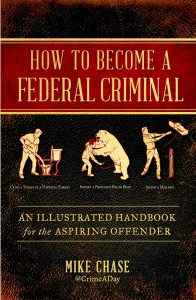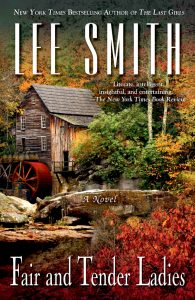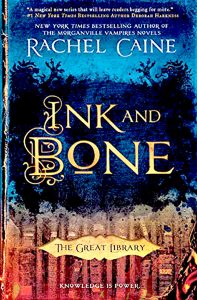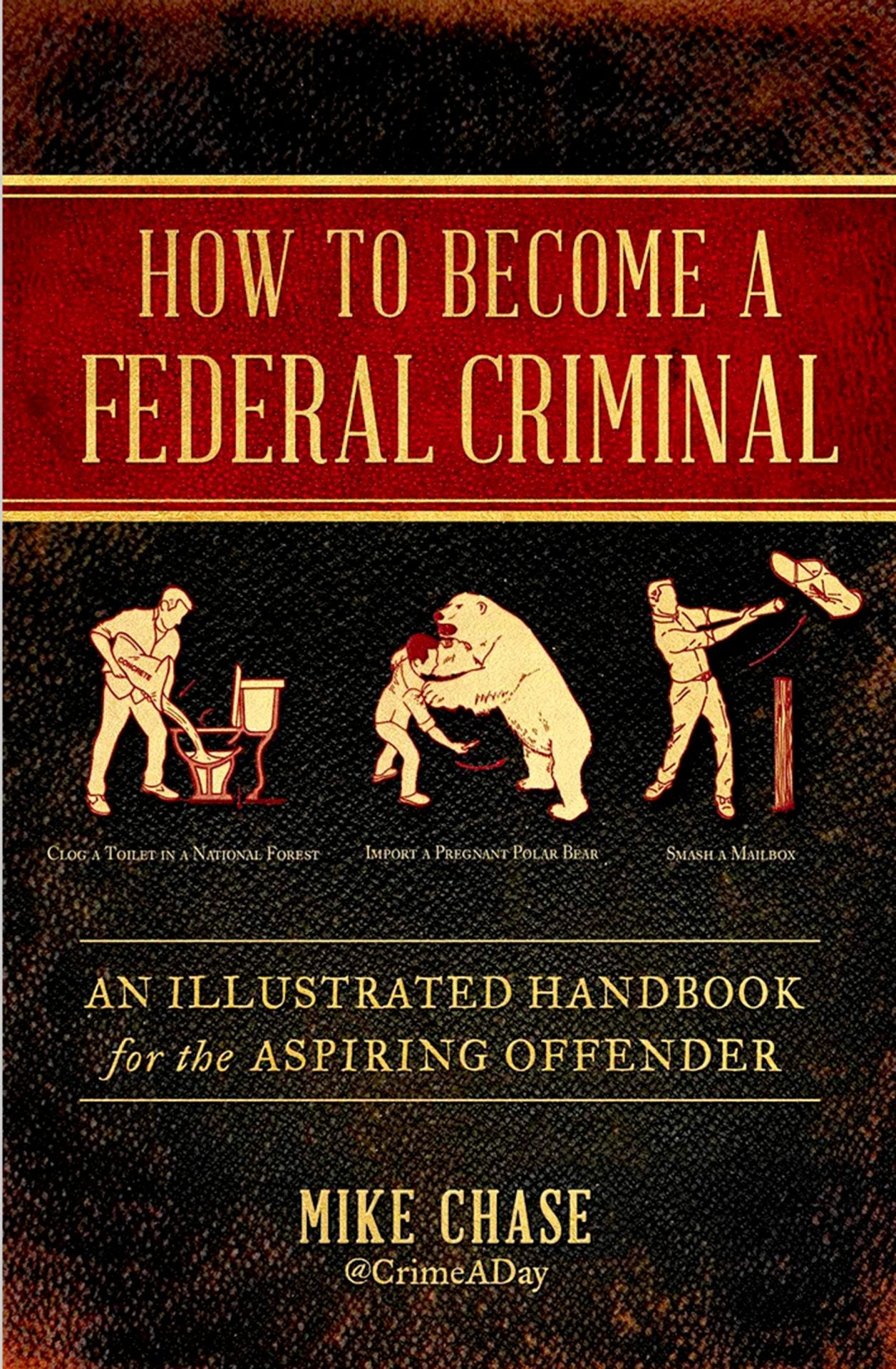“How To Become a Federal Criminal: An Illustrated Handbook for the Aspiring Offender” by Mike Chase

Strange laws reflect strange times. Frankfort once had a statute that made it illegal to carry an ice cream cone in your pocket. I couldn’t imagine why that was necessary, but research revealed it was enacted to deter horse thieves from luring horses away.
Today when Congress can’t seem to pass any appropriate legislation, it’s interesting to look back and realize that perhaps former legislators went a bit overboard. With “How to Become a Federal Criminal,” I was hoping to discover obscure federal statutes. And I was not disappointed, they are hilarious!
Alcohol crimes consume a large portion of the book over many other topics. The Volstead Act was repealed after 13 years, but many of the criminally enforceable federal liquor laws associated with Volstead remain on the books. It is a “crime to distill spirits without a permit, say something obscene on a beer bottle label or build a pipeline of tax-free wine.”
But despite former President Herbert Hoover’s “great social and economic experiment, noble in motive and far-reaching in purpose,” the government was mainly interested in additional tax revenue. A single person is permitted to brew 100 gallons of tax-free beer, and for two people in a household, that number jumps to two hundred gallons. But the feds won’t allow you to increase the beer limit when you have kids, no matter how badly you might need it.
Wine label regulation states that you can’t promote the intoxicating value of your wine, but the alcohol level must be listed. You can’t use a label name of a distilled liquor product such as “Manhattan” or even “Zombie.”
Distilled spirits is the big revenue source. Tax agents were authorized to break down the doors of distilleries, conduct night stakeouts and follow distillery customers home. If those agents had been more diligent, they might have uncovered “Pappygate.”
Legislators can be real party poopers. There are laws to protect the grounds of the U.S. Capitol that were enacted after an Easter Egg Roll in 1876. It was estimated that 10,000 kids participated in the roll down the sloping lawn and left the turf visibly damaged. However, the kids were not informed of the statutory ban and the following year they showed up with their eggs.
Nor were they allowed to sled down the hill in the snow. But in 2015, there was a sled-in by protesters urging the U.S. Capitol Police to not enforce the ban. The Legislative Branch Appropriations Bill, which is renewed each year since, states that the police will “forbear enforcement when encountering snow-sledders on the grounds.”
Another caution when visiting the U.S. Capitol grounds: daggers, dirks or stilettos over 3-inches are prohibited. I don’t think they meant stiletto heeled shoes, but lawmakers do not wish close encounters with armed members of the public. So, even placing your pocket knife in a planter outside the U.S. Capitol before entering is a crime. And, they have cameras everywhere!
One last note, if you should decide to move a picnic table in a National Park, you have committed another crime. And the law does not distinguish between an inch or a foot from the original location. The fine is as much as $1,000 and up to one year in prison.
After all, lawmakers only have our best interests as their priority. Surely!
~ Reviewed by Lizz Taylor, Poor Richard’s Books
“Fair and Tender Ladies,” by Lee Smith

Ivy Rowe lives on a mountain top at the turn of the century in rural Virginia along Sugar Fork. She is as isolated as one can be and yet connects with many by writing letters. She is not well educated, but even her “down home” speech is detailed, complete with the innocence of a child.
She begins by writing to a Dutch pen friend as an assignment from her teacher. She describes her family, their mountain, the animals and plants that are part of Ivy’s world. She continues to write to family and friends over the years. Her voice is always passionate and clear even in the face of disaster and tragedy.
Even though the reader only knows Ivy’s voice, we also know of her correspondents from Ivy’s reactions to their stories. Lee Smith is able to paint an entire community through Ivy’s letters.
The novel covers Ivy’s early years and her rebellion with her parents in her teenage years when she is determined to never marry, only to become a mother. She writes of her children and their children. Though Ivy never leaves her mountains, she has a life full of passion and wonder.
A novel written in the form of letters or diary entries is known as an epistolary novel. This method is used by Smith to reflect the isolation of a typical mountain girl. The colloquial use of language and Ivy’s misspellings does not diminish Ivy’s character.
Smith understands Appalachian culture and displays an appreciation for the history as she grew up in this region. She has an ear for the authentic speech and language of the locals. Smith grew up in the coal mining town of Grundy, Virginia, less than 10 miles from the Kentucky border.
In this age of social media, it’s refreshing to read letters that truly connect with a voice that could have been our grandmothers.
~ Reviewed by Lizz Taylor, Poor Richard’s Books
“The Overstory” by Richard Powers

2019 Pulitzer Prize Winner “The Overstory” connects us back to nature with the fight and heart of environmental activism. This book is a rich novel. It’s not a light read that can be finished in a single afternoon. However, all 502 pages are well worth reading.
Nine different characters make deep connections to trees in the first part of the book. Each story is different from the one before, but they all contain a connection to the trees. Spanning across time and geography and appropriately titled “Roots,” the first part works as a strong foundation for the rest of the story. The remainder of the novel brings the nine characters together and places the reader into the fight to protect the trees.
Much like “The Lorax,” ‘The Overstory” “speaks for the trees.” After reading the novel, I feel a deeper love for trees and their importance in our lives. This book is a bridge back to nature. It gives voice to the tall silent ones that keep our world growing and thriving.
~ Reviewed by Grace Wilson, Paul Sawyier Public Library
“Ink and Bone” by Rachel Caine

Long ago, the Library of Alexandria was never destroyed. In this modern, parallel universe, the Great Library now transcends borders, has daughter libraries in every nation and controls all knowledge and learning.
Each person has a codex or reader to access and borrow from the Great Library’s collection, and real, paper books are outlawed.
Enter Jess Brightwell — book smuggler, bibliophile and sometimes thief — who enters into training to be a Librarian (with a capital L). He was sent to be a spy for the Brightwell family, but his loyalties to family and the library are tested.
While the library presents a benevolent face to the world, Jess discovers a darker side to the library’s power and the lengths to which the head archivist will go to keep that power. Free and open access to ideas is a worthy goal, but is it still the goal of this illustrious institution?
This thrilling book is the first in the Great Library series, chronicling the adventures of a small group of rebels from within the library.
~ Reviewed by Stacy Stamper, Paul Sawyier Public Library










